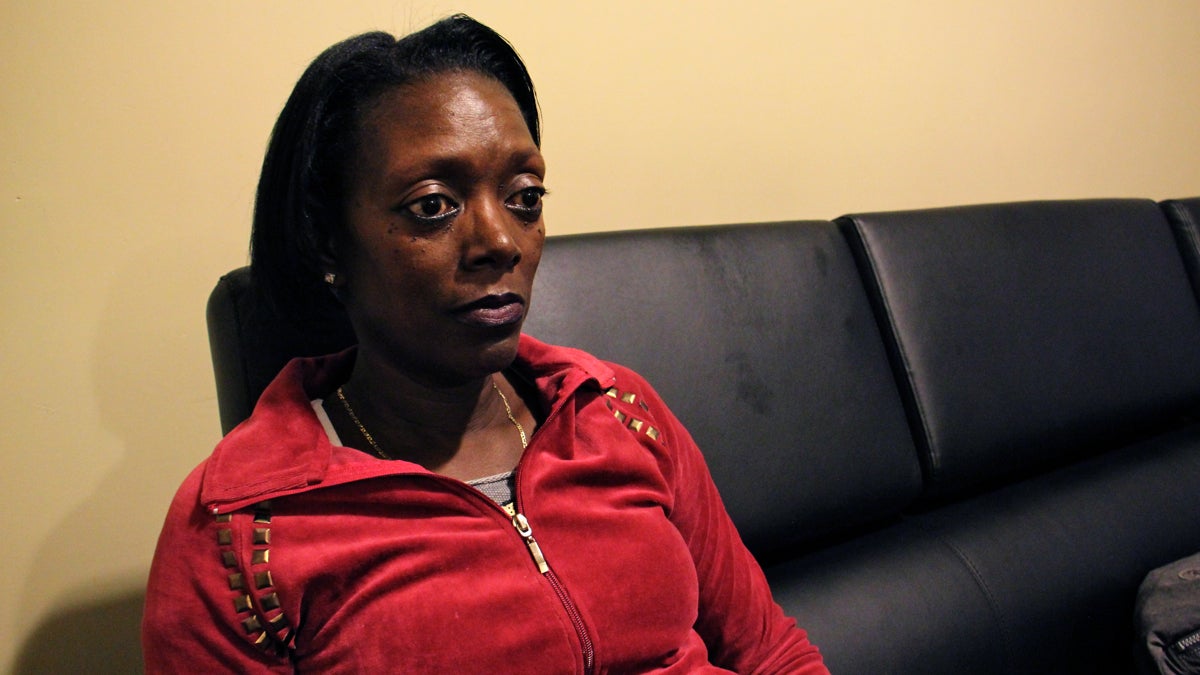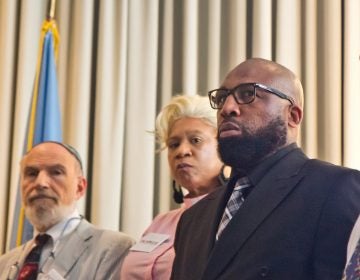Defendant’s quest for second look at case can outlast sentence in Philly
Listen 5:44
Emma Turner was granted a new trial on drug charges after identifying an alibi witness, but the new trial was averted because her probation ended as the case was pending. (Emma Lee/WHYY)
Police had their eye on Emma Turner’s Aramingo Avenue house long before November 2006. But that’s when she learned about it.
“I was mixing potato salad, and they bust in the door, never knock, push me into the counter, my head almost hit the cabinet door, where there were two nails sticking out,” said Turner, 52, of the raid on her house by Philadelphia police officers and other authorities.
She held up her hand to a reporter, showing an indelible physical reminder of that day, Nov. 21, almost exactly 10 years ago.
“You see the two black dots on my hand, my palm? They came from the nails in the cabinet.”
This was just the beginning for Turner, whom police suspected of running a drug operation out her Port Richmond home.
Turner, then a teacher at John Paul Jones Middle School, is the mother of six biological children but ended up raising eight after assuming custody of two of her neighbors’ children.
She had no criminal history. Police say an undercover agent sold her drugs. While her then-boyfriend and son were under suspicion, there was no direct evidence she had purchased drugs, court records show. And she had an alibi witness who said she was making Thanksgiving dinner for kids at John Paul Jones when authorities claim she made a narcotics purchase.
Yet that witness never testified at trial, and Turner was sentenced to two years of probation after being convicted of one of the four charges she faced during a bench trial. She filed for an appeal, citing the missing witness, and won a new trial. She and her attorney, Elayne Bryn, were elated.
“I was happy, I was crying. Elayne was crying. It was nice. I really thought I was going to get relief now,” she said.
But the hearing never happened. Prosecutors kept asking for more time to respond until her probation was over, then they appealed. The matter made its way to the Pennsylvania Supreme Court, which ruled in 2013 in a precedent-setting case that since Turner was no longer on probation, she doesn’t have a case anymore. Under state law, a person filing a post-conviction appeal must be incarcerated, or on probation. Turner’s case, however, took it a step further when the high court declared it not a violation of constitutional rights when a appeal becomes moot, even if the petition was originally filed while in state custody.
Or, as rendered by the court, Turner “has no protected liberty interest in collateral review at this juncture because she is no longer subject to a state sentence.”
To Turner’s attorney, who argued that her due process rights should not be violated by dint of a short sentence, the court cited a state precedent that said striking a reasonable balance between “society’s need for finality in criminal cases and the convicted person’s need to demonstrate there has been an error” can place limits on someone’s ability to appeal.
By then, Turner had already paid a heavy price. Authorities had seized her assets, including the house she owned on the 2800 block of Aramingo Avenue.
“I lost my home, I lost my car, I lost all my money. Years of hard-earned work. Everything in my home, I lost,” Turner said.
To defense lawyers, a nightmare scenario
This is a defense attorney’s worse nightmare — that a client will have served out a sentence of prison or probation before an appeal can be heard. Some fear the situation will arise more and more as the appeals — known as a Post-Conviction Relief Act petition — pile up and pressure an already stressed criminal justice system in Philadelphia.
There are currently 1,500 of them pending in Philadelphia’s state court system, not including frivolous petitions. Half of them have not yet been assigned to attorneys and judges, according to a spokesman for the First Judicial District.
Only about a dozen defense attorneys are regularly appointed by the court to take them on.
Around 800 to 1,200 new petitions are filed from area prisons every year.
“It doesn’t take much back-of-the-envelope math to see that that’s not just a temporary backlog issue. That’s an unsustainable model,” said Henry Sias, a defense attorney who frequently works on PCRA cases.
He said it isn’t popular work. The pay rate hasn’t changed since the ’90s — about $40 an hour. Checks don’t arrive until work is complete, which could take a year or more if the client had a lengthy trial. All the clients are currently incarcerated, or on probation, and many have already filed appeals, making their cases hard to work through. Few of them succeed at winning new hearings.
“All of my clients are already in a bad position by the time they come to my desk. And when you get a victory, you have to let that victory sustain you for years,” said Sias.
Moreover, being a PCRA attorney, Sias said, doesn’t always foster good will among colleagues in the defense bar.
“You also have to be willing to say, OK, senior respected attorney, you were ineffective for all these different reasons, and one of the reasons is that this judge that’s presiding over this hearing and who is going to approve, cut or deny my fee petition, did something unconstitutional during the trial, and you failed to object,” Sias said. “That takes a lot of strength.”
Post-conviction appeals seen as critical to fair process
This type of post-conviction appeal, according to Temple University law professor Jules Epstein, is critical to the process.
“You get a new lawyer whose job it is to first, read over whatever happened and see what mistakes were made on the record. And sometimes, mistakes off the record … a lawyer didn’t find the right witnesses, didn’t get the right expert,” Epstein said.
Judges evaluating the crush of petitions usually ask themselves two things, he said.
“Question one, were there mistakes? Question two, even if there were mistakes, did they truly affect the outcome?”
He said the mounting backlog with few attorneys willing to dive into these cases can create troubling situations such as Turner’s — when delay effectively deprives someone of having their questionable case re-examined.
“Well, I’m sitting in jail. And maybe everybody would agree, ‘My God, you got too much time,’ but by the time we get to it, you’ve done too much time, so the delay is an issue,” Epstein said.
‘Inventory’ not ‘backlog,’ says judge
On the 12th floor of the Criminal Justice Center, there’s someone with another prospective. Some have called the backlog situation a crisis, but in his chambers, Judge Leon Tucker, who oversees the criminal division, shot this notion down.
“No, not a crisis,” he said.
Tucker even rejects the term “backlog” of PCRA petitions.
“We have an inventory of cases. PCRA cases, as well as non-PCRA cases. Those cases are moving forward in a timely fashion,” Tucker said.
He admitted that post-conviction work isn’t so popular among criminal defense attorneys, but he hopes more will sign up for them.
“Some people don’t like to do them, but, nonetheless, they have to be done. And therefore, the decision was made, if you’re able to take any case on a court-appointed basis, then you should take the PCRA as well.”
Since taking over the criminal division in March, Tucker said he’s identified 147 defense attorneys qualified to do the appeals cases, much more than the dozen or so who regularly appear on court-appointed lists.
Several attorneys, off the record, said letters sent out to lawyers asking them to take appeals clients come off as the court begging. Tucker disagreed.
“We’re not begging anyone to do anything. We have attorneys who have signed up to do this work, and are doing it,” he said.
But until the backlog is depleted, advocates including Pennsylvania Innocence Project director Marissa Bluestine say those seeking appeals could be missing opportunities to fight for their freedom.
“If you have a person who should not have been convicted because of gross constitutional error, or even innocence, it will take years before that can be addressed,” Bluestine said. “In some cases, the delay can be so long, they lose the right to even appeal their conviction at all.”
Bluestine said more city and state funding is needed for court-appointed appeals attorneys, otherwise “we’ll just continue to pay the price with prolonged, unnecessary incarcerations.”
David Carroll, executive director of the national Sixth Amendment Center, said he’s examined many court systems, and this issue seems to be unique to Philadelphia.
“Getting rid of this backlog, I think, this problem is going to be there four, five years, even under the best of circumstances. Major comprehensive reform,” Carroll said.
Just throwing more money at the problem, however, is not enough, he added.
“You need the training, mentorship and supervision to ensure that the investment of those new monies is worth it,” Carroll said.
Sias agreed. He has suggested starting a nonprofit clinic, with backing from a local law school, that would serve as a place to receive professional PCRA training and to staff lawyers who are already expert in handling them to assist in easing the mountain of pending petitions.
No opportunity to fight
Emma Turner, meanwhile, said had her new trial actually happened, her life would’ve been starkly different.
“It steals the joy of wanting to keep moving on. That’s what it did for me. It took away everything inside my soul I worked so hard for,” said Turner, who just started a home renovation business in addition to baby-sitting on the side.
For instance, she took out an $18,000 loan to pay for a private attorney, something she’s still repaying. Other things in her life are not redeemable.
“I really, really worked hard for that house. I worked hard to give my kids a better life. And then, what happened? All I hear about is ‘the drug dealer.'”
Most of all, Turner said, running out the clock should not have ended her appeal. Since her case was decided, it has been cited by other rulings denying petitioners in Philadelphia their day in court because of a mix of backlog issues and delay tactics by prosecutors, legal experts say.
“I feel as though you should have an opportunity to fight, at least clear yourself and clear your name, to at least get it off your record.”
In a statement, Philadelphia district attorney office spokesman Cameron Kline said prosecutors are “in no way responsible for the delay” in Turner’s case. Kline said Turner “waited an entire year from the day she was sentenced” to file her appeal; by then, she had served half her sentence. Turner’s filing was within the one-year time limit required by state law. But Kline suggested Turner contributed to the holdup in her case.
Kline said the trial judge, who found Turner guilty of one of the four charges she faced, believed she was involved in drug transactions.
And he said the alibi evidence Turner presented did not correspond to the times of the alleged drug transactions. A judge, however, awarded Turner a new trial based on that evidence.
WHYY is your source for fact-based, in-depth journalism and information. As a nonprofit organization, we rely on financial support from readers like you. Please give today.




